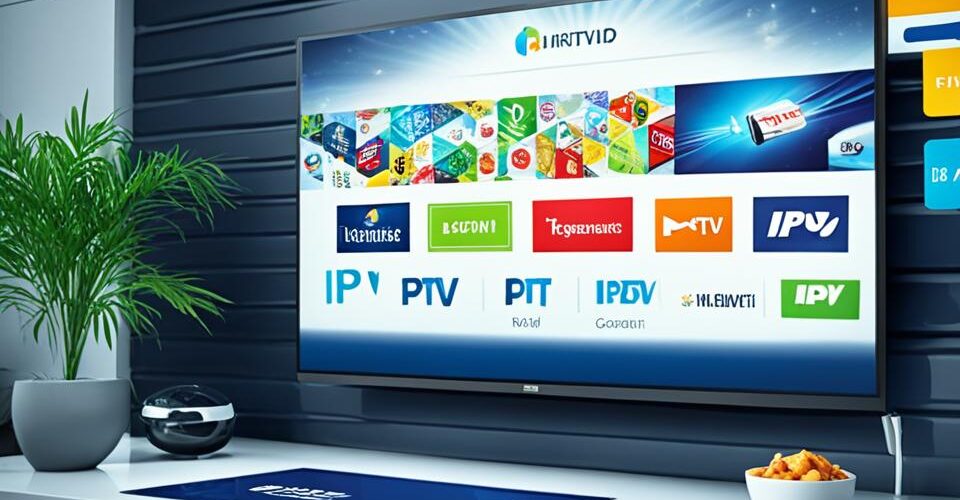Did you know that IPTV is reshaping the advertising industry by providing targeted content to specific audiences? With the rise of Internet Protocol Television (IPTV), advertisers now have the ability to reach their target demographics in a way that was never possible before.
Traditionally, television advertising has been a one-size-fits-all approach, with ads broadcasted to a broad audience without any customization. However, IPTV allows for personalized and targeted advertising, ensuring that ads are relevant and engaging to a specific group of viewers.
In this article, we will explore the impact of IPTV on advertising and how it has revolutionized the way advertisers target audiences in the digital age. We will delve into the advantages of IPTV for advertisers, the role it plays in audience segmentation, and how it is changing the advertising landscape.
Get ready to discover the power of IPTV and how it can help you create more effective and personalized advertising campaigns.
Key Takeaways:
- IPTV allows for targeted and personalized advertising, reaching specific audiences in a way that traditional television advertising cannot.
- IPTV provides valuable insights into consumer behavior, helping advertisers refine their strategies and improve ad effectiveness.
- The future of IPTV advertising looks promising, with advancements in technology and increasing demand for personalized content.
- Choosing the right IPTV advertising strategy involves selecting a reputable service provider and understanding pricing and channel options.
- By leveraging the power of IPTV, advertisers can stay ahead and effectively target audiences in the ever-evolving world of television.
What is IPTV and How Does it Work?
IPTV, or Internet Protocol Television, refers to the delivery of television programming and video content through internet protocol networks. Unlike traditional methods such as cable or satellite, IPTV utilizes the internet to transmit content directly to viewers’ devices. This modern technology offers flexible and convenient access to a wide range of on-demand content, live TV channels, and interactive features.
So how does IPTV work? It operates by leveraging IP multicasting, which optimizes bandwidth usage and ensures a smooth viewing experience for users. By transmitting content over IP networks, IPTV delivers a seamless and interactive viewing experience.
How IPTV Works
When a user requests a specific show or video on their IPTV-enabled device, a request is sent to the IPTV server. The server then retrieves the requested content and delivers it to the user’s device through the internet. The content is transmitted in the form of data packets, which are received and displayed by the user’s device.
One of the key advantages of IPTV is its ability to deliver content in real-time or on-demand. Users can access live TV channels, catch up on missed episodes, and enjoy a vast library of movies and shows whenever they want.
The Benefits of IPTV
IPTV offers numerous benefits for viewers and content providers alike. For viewers, IPTV provides a customizable and interactive television experience. They have the freedom to choose the content they want to watch, when they want to watch it.
Content providers benefit from IPTV’s efficient and cost-effective content delivery. By utilizing internet protocol networks, they can distribute content to a wide audience without the need for expensive hardware or infrastructure. IPTV also allows providers to gather valuable data on viewer preferences and behavior, enabling them to deliver targeted and relevant content.
Advantages of IPTV
| Advantages | Description |
|---|---|
| Flexible Content Access | Users can enjoy on-demand content, live TV channels, and interactive features. |
| Customizable Viewing Experience | Viewers have the freedom to choose the content they want to watch and when to watch it. |
| Efficient Content Delivery | IPTV utilizes internet protocol networks to distribute content to a wide audience without costly infrastructure. |
| Targeted Advertising | Content providers can gather data on viewer preferences to deliver relevant and personalized advertisements. |
Overall, IPTV offers a modern and convenient way to access and enjoy television content. Its combination of flexible content delivery, interactive features, and targeted advertising makes it a powerful tool for both viewers and content providers.
The Advantages of IPTV for Advertisers
IPTV offers several advantages for advertisers looking to reach their target audiences. With IPTV’s ability to deliver personalized content and targeted advertising, advertisers can tailor their messages to specific demographics and increase the relevance of their ads. This leads to higher engagement and conversion rates.
One of the key advantages of IPTV advertising is the ability to deliver personalized content to viewers. By analyzing user data, such as viewing habits and preferences, advertisers can create customized ad experiences that resonate with their target audiences. This level of personalization enhances the viewer’s experience and increases their likelihood of engaging with the ad.
Additionally, IPTV enables targeted advertising, allowing advertisers to reach the right audience at the right time. With IPTV’s advanced targeting capabilities, advertisers can deliver ads based on factors such as demographics, location, and interests. This targeted approach ensures that ads are seen by the most relevant audience, maximizing their impact and effectiveness.
IPTV also provides opportunities for interactive advertising, creating a more engaging and immersive ad experience. Through features like social media integration and real-time voting, viewers can actively participate and interact with ads, making them more memorable and shareable.
With all these advantages, IPTV advertising offers advertisers a powerful tool to connect with their target audiences in a more personalized and impactful way. By leveraging the benefits of IPTV, advertisers can optimize their advertising strategies and achieve better results in today’s digital age.
Advantages of IPTV for Advertisers:
- Personalized content delivery
- Targeted advertising based on demographics and interests
- Higher engagement and conversion rates
- Interactive advertising experiences

With IPTV’s ability to deliver personalized and targeted advertising, advertisers can tailor their messages to specific demographics and increase the relevance of their ads. This leads to higher engagement and conversion rates.
How IPTV is Changing the Advertising Landscape
IPTV, or Internet Protocol Television, is significantly transforming the advertising landscape, opening up new avenues for digital marketing strategies. With the personalized and targeted advertising capabilities of IPTV, advertisers can deliver relevant content to the right audience at the right time. This level of precision improves the effectiveness and efficiency of advertising campaigns, resulting in higher returns on investment for advertisers. Furthermore, the integration of IPTV with other digital marketing channels allows for holistic and cohesive advertising strategies.
Targeted Advertising for Enhanced Relevance
One of the key ways IPTV is revolutionizing the advertising landscape is through targeted advertising. Advertisers can leverage the advanced targeting capabilities of IPTV to tailor their messages precisely to specific demographics. By understanding and analyzing viewer data, such as their preferences and habits, advertisers can deliver highly relevant content that resonates with their target audience. This relevancy not only increases engagement but also improves the overall effectiveness of advertising campaigns.
Efficiency and Cost-Effectiveness
IPTV offers advertisers a more efficient and cost-effective way to reach their target audience. By eliminating the need for traditional media buying processes and optimizing ad delivery through IPTV platforms, advertisers can reduce costs and maximize the impact of their advertising budgets. Additionally, the ability to monitor and analyze real-time ad performance allows advertisers to make data-driven decisions and optimize their campaigns on the fly.
The Power of Data Integration
Integration is a key strength of IPTV in the advertising landscape. By integrating IPTV with other digital marketing channels, such as social media and online display ads, advertisers can create cohesive and comprehensive marketing strategies. This integration enables consistent messaging across multiple touchpoints and ensures a seamless user experience. Moreover, the data collected from IPTV viewers can be combined with data from other channels to gain deeper insights into consumer behavior and preferences, further enhancing targeting capabilities.
IPTV is transforming the advertising landscape, empowering advertisers with personalized and targeted marketing strategies. The ability to deliver relevant content to the right audience at the right time, combined with increased efficiency and data integration, is revolutionizing the way advertising campaigns are created and executed. As IPTV continues to evolve, advertisers must adapt their digital marketing strategies to leverage this powerful platform and stay ahead in the ever-changing advertising landscape.
The Role of IPTV in Audience Segmentation
IPTV plays a crucial role in audience segmentation, providing advertisers with the ability to divide their target audience into smaller, more specific groups for targeted advertising. Audience segmentation allows advertisers to deliver tailored ads that resonate with specific segments of their target audience, increasing the relevance of their messages and improving the overall effectiveness of their advertising campaigns.
Segmentation can be based on various factors including demographics, interests, viewing habits, and other relevant data. By understanding the unique characteristics of different audience segments, advertisers can customize their advertising content to better align with the preferences and needs of each segment.
Benefits of Audience Segmentation in IPTV Advertising
Effective audience segmentation in IPTV advertising offers several benefits:
- Increased Relevance: Delivering personalized ads to specific audience segments ensures that the content resonates with viewers, driving higher engagement and conversion rates.
- Optimized Messaging: By understanding the unique attributes of each segment, advertisers can craft messages that effectively address the specific needs and interests of the target audience.
- Improved ROI: Targeted advertising enables advertisers to allocate their budgets more efficiently by focusing on segments that are more likely to respond positively to their ads, resulting in better return on investment.
Example: Audience Segmentation in IPTV Advertising
| Audience Segment | Characteristics | Targeted Advertising Approach |
|---|---|---|
| Millennial Sports Fans | Age: 18-34Interests: Sports, fitness, outdoor activitiesViewing Habits: Live sports events, sports documentaries | Deliver ads during live sports events and showcase sports-related products, fitness equipment, and outdoor gear. |
| Parents with Young Children | Age: 25-44Interests: Parenting, educational contentViewing Habits: Children’s shows, educational programs | Promote educational toys, children’s books, and family-friendly products during children’s shows and educational programs. |
| Tech Enthusiasts | Age: 18-45Interests: Technology, gadgets, gamingViewing Habits: Tech reviews, gaming events | Showcase the latest technology products, gaming consoles, and gadgets during tech reviews and gaming events. |
By using IPTV to segment their audience and tailor their advertising approach accordingly, advertisers can engage with their target audience more effectively, resulting in a higher likelihood of conversions and a more personalized viewing experience for viewers.

The Impact of IPTV on Consumer Behavior Insights
IPTV, or Internet Protocol Television, offers advertisers a wealth of valuable insights into consumer behavior. By collecting and analyzing data, advertisers can gain important information about viewer preferences, content consumption patterns, and engagement levels. Leveraging these insights allows advertisers to refine their advertising strategies, optimize ad placement, and ultimately improve the effectiveness of their advertising campaigns.
With IPTV, advertisers can obtain detailed data on viewer preferences, such as the types of content they consume, their favorite genres, and their preferred viewing times. This information enables advertisers to tailor their ad content to align with viewer preferences, making their messaging more relevant and engaging.
Furthermore, IPTV allows for the measurement of viewer engagement levels, providing advertisers with a deeper understanding of how their ads resonate with audiences. By analyzing data such as viewership duration, click-through rates, and social media interactions, advertisers can gauge the effectiveness of their campaigns and make data-driven decisions to optimize their advertising strategies.
The Power of Data-Driven Advertising Strategies
IPTV data not only provides insights into consumer behavior but also empowers advertisers to create more targeted and personalized advertising campaigns. By understanding viewer preferences and engagement patterns, advertisers can deliver ads that resonate with specific audience segments. This targeted approach increases the chances of capturing viewers’ attention and driving desired actions.
Moreover, by analyzing consumer behavior insights from IPTV, advertisers can identify emerging trends, market segments, and untapped opportunities. This allows them to stay ahead of the competition and adapt their advertising strategies to meet the evolving needs and preferences of their target audience.
In summary, IPTV offers advertisers a treasure trove of consumer behavior insights that can enhance the effectiveness of their advertising efforts. By leveraging these insights, advertisers can create more targeted, personalized, and impactful advertising campaigns that resonate with viewers and drive desired outcomes.
IPTV Advertising Trends and Strategies
IPTV advertising is constantly evolving, and staying updated with the latest trends and strategies is crucial for advertisers looking to make the most of this dynamic medium. By adopting innovative approaches, advertisers can effectively leverage IPTV to reach their target audiences and maximize the impact of their campaigns.
Programmatic Advertising
One key trend in IPTV advertising is programmatic advertising, which enables automated ad buying and targeting. With programmatic advertising, advertisers can utilize sophisticated algorithms and real-time data analysis to make informed decisions about ad placement and audience targeting. This allows for more precise and efficient delivery of ads to the most relevant viewers, increasing the chances of engagement and conversions.
Dynamic Ad Insertion
Dynamic ad insertion is another important strategy in IPTV advertising. This technology enables the delivery of targeted ads in real-time, ensuring that viewers see the most relevant content based on their demographics, interests, and viewing behavior. By seamlessly inserting ads into live or on-demand content, advertisers can tailor their messages to specific audience segments, enhancing ad effectiveness and improving overall campaign performance.
Interactive Ad Formats
Interactive ad formats play a significant role in engaging viewers and fostering brand interaction. With IPTV, advertisers can leverage interactive features such as clickable overlays, quizzes, polls, and social media integration to create immersive ad experiences. These interactive elements not only capture the attention of viewers but also encourage active participation and increase brand recall. By utilizing interactive ad formats, advertisers can reinforce their messaging and drive deeper engagement with their target audience.
Adopting these trends and strategies in IPTV advertising empowers advertisers to optimize their campaigns and achieve better results in reaching their target audiences. Embracing programmatic advertising, dynamic ad insertion, and interactive ad formats allows for greater precision, relevance, and engagement, ultimately maximizing the potential of IPTV as a powerful advertising channel.

| Trend | Description |
|---|---|
| Programmatic Advertising | Automated ad buying and targeting, leveraging real-time data analysis to reach the most relevant audiences. |
| Dynamic Ad Insertion | Real-time delivery of targeted ads based on viewer demographics, interests, and viewing behavior. |
| Interactive Ad Formats | Incorporating clickable overlays, quizzes, polls, and social media integration to create engaging ad experiences. |
The Potential Challenges of IPTV Advertising
While IPTV offers significant advantages for advertisers, there are also potential challenges to consider. One challenge is ensuring compliance with legal and copyright regulations. Advertisers must ensure that the content they advertise adheres to copyright laws and that they have the necessary rights and permissions to use the content. Additionally, there may be concerns about the legality and ethics of certain IPTV platforms and services, requiring advertisers to be diligent in their selection and partnerships.
Legal and copyright issues pose significant challenges in the realm of IPTV advertising. Advertisers must navigate a complex landscape of laws and regulations to ensure they are operating within the boundaries of intellectual property rights. Failure to do so can result in legal repercussions, damage to brand reputation, and financial losses.
Compliance with legal and copyright regulations is crucial in IPTV advertising.
One of the primary concerns in IPTV advertising is the unauthorized use of copyrighted material. Advertisers must be cautious when selecting and utilizing content for their advertisements to avoid infringing upon copyright laws. This includes obtaining proper licenses, permissions, and clearances from rights holders.
Add to these challenges the potential issues surrounding the legality and ethics of certain IPTV platforms and services. Advertisers must thoroughly research and vet these platforms to ensure that they adhere to industry standards and ethical practices. This includes verifying the sources of the content, the validity of the licenses they hold, and the legality of their operations.
Selecting the right IPTV platforms and services is essential to avoid any legal or ethical complications.
Advertisers should also be cautious about partnering with IPTV service providers that offer access to illegal or pirated content. Associating advertising with such platforms not only raises legal concerns but also tarnishes the brand image and credibility of the advertiser.
Choosing reputable and trustworthy IPTV service providers is crucial to maintaining brand integrity.
Overall, while IPTV advertising provides valuable opportunities for advertisers, it is vital to address the challenges associated with legality and copyright issues. Advertisers must prioritize legal compliance, obtain the necessary rights and permissions, and carefully evaluate the ethics and legality of IPTV platforms and services. By doing so, advertisers can execute effective and responsible IPTV advertising campaigns that align with industry standards and regulations.
The Future of IPTV Advertising
The rapid advancements in technology and the increasing demand for personalized and targeted content are paving the way for an exciting future in IPTV advertising. As the digital landscape continues to evolve, IPTV is set to revolutionize television advertising with its innovative capabilities. Advertisers can expect enhanced ad targeting, interactive experiences, and improved relevancy in their campaigns.
One of the key advancements driving the future of IPTV advertising is the integration of artificial intelligence (AI) and machine learning (ML) technologies. These cutting-edge developments empower advertisers to optimize their advertising strategies by analyzing vast amounts of data and implementing intelligent targeting algorithms. With AI and ML, IPTV can deliver ads that align with viewers’ preferences, creating a more personalized and engaging advertising experience.
Moreover, IPTV’s interactive features will enable advertisers to create immersive and engaging ad experiences. Viewers can actively engage with ads through interactive elements such as quizzes, polls, and social media integration. By fostering viewer participation, IPTV advertising will forge stronger connections between brands and consumers.
Furthermore, the future of IPTV advertising will witness a significant improvement in ad relevancy. As AI algorithms continue to advance, they will better understand viewer behavior and preferences. This deep understanding will enable advertisers to deliver highly targeted advertisements that resonate with specific audiences. By aligning ads with viewers’ interests and preferences, IPTV advertising will maximize engagement and conversion rates.
The Benefits of the Future IPTV Advertising
The future of IPTV advertising offers several benefits for advertisers:
- Enhanced ad targeting capabilities based on advanced AI and ML algorithms
- Interactive ad experiences that capture viewer attention and encourage engagement
- Improved relevancy of ads, leading to increased viewer engagement and conversion rates
With these advantages, IPTV advertising will play a pivotal role in shaping the future of television advertising. Advertisers who embrace the potential of IPTV can stay ahead of the competition and effectively reach their target audiences in the dynamic digital landscape.
| Advancements | Benefits |
|---|---|
| Integration of AI and ML technologies |
– Enhanced ad targeting – Personalized ad experiences – Improved campaign performance |
| Interactive ad features |
– Increased viewer engagement – Strengthened brand-consumer connections |
| Improved ad relevancy |
– Higher engagement and conversion rates – Greater ad effectiveness |
Choosing the Right IPTV Advertising Strategy
When it comes to IPTV advertising, selecting the right strategy is crucial for the success of your marketing campaigns. Consider the following factors to make an informed decision:
1. Reputable and Reliable Service Provider
Choose an IPTV service provider that has a strong reputation and a track record of delivering reliable services. Look for providers that offer secure and stable connections to ensure uninterrupted broadcasting of your advertisements.
2. Pricing Models and Subscription Options
Understand the pricing models offered by different IPTV service providers. Some providers may offer monthly subscriptions, while others may offer pay-per-view options. Determine which pricing structure aligns with your budget and advertising goals.
3. Channel Selection and Device Compatibility
Evaluate the channel selection offered by each IPTV service provider. Consider whether they provide channels that are relevant to your target audience. Additionally, ensure that the service is compatible with a wide range of devices, including smartphones, tablets, smart TVs, and streaming devices.
4. Customer Support
Look for IPTV service providers that offer excellent customer support. Responsive and knowledgeable customer support can help address any issues or questions that may arise during the implementation of your advertising campaigns.
5. Ability to Target Specific Demographics
Consider the targeting capabilities offered by each IPTV service provider. Some providers may offer advanced targeting options based on demographics, location, interests, and viewing preferences. Choose a provider that aligns with your desired target audience for maximum effectiveness.
By carefully assessing these factors, you can select the right IPTV advertising strategy that aligns with your marketing goals. Here’s an image to illustrate the process:
Comparing IPTV Advertising Strategies
| Factor | Service Provider A | Service Provider B | Service Provider C |
|---|---|---|---|
| Reputable and Reliable | ✔️ | ✔️ | ✔️ |
| Pricing Models | Monthly subscription | Pay-per-view | Monthly subscription |
| Channel Selection | 200+ | 150+ | 250+ |
| Device Compatibility | Smartphones, Tablets, Smart TVs | Smart TVs, Streaming Devices | Smartphones, Tablets, Smart TVs, Streaming Devices |
| Customer Support | 24/7 Live Chat, Phone | Email, Phone | 24/7 Live Chat, Email |
| Targeting Options | Demographics, Interests, Location | Demographics, Location | Demographics, Interests, Location, Viewing Preferences |
Based on the comparison table, analyze each service provider’s offerings to make an informed decision. By considering all these factors, you can formulate a strong IPTV advertising strategy that will effectively reach your target audience and drive the desired results for your brand.
Conclusion
In conclusion, IPTV (Internet Protocol Television) is revolutionizing advertising in the digital age by providing opportunities for targeted and personalized content delivery. With IPTV, advertisers can reach specific audiences and create more engaging and effective advertising campaigns.
One of the key advantages of IPTV is its ability to gather valuable consumer behavior insights. By collecting and analyzing data, advertisers can better understand viewer preferences, content consumption patterns, and engagement levels. This allows for the refinement of advertising strategies and optimization of ad placement, resulting in improved advertising effectiveness.
The future of IPTV advertising looks promising as advancements in technology continue to enhance ad targeting capabilities. With the increasing demand for personalized content, IPTV is set to shape the future of television advertising. By embracing the potential of IPTV, advertisers can stay ahead in the ever-evolving world of television and effectively target audiences in the digital age.
FAQ
What is IPTV and how does it work?
What are the advantages of IPTV for advertisers?
How is IPTV changing the advertising landscape?
What is the role of IPTV in audience segmentation?
How does IPTV impact consumer behavior insights?
What are some IPTV advertising trends and strategies?
What are the potential challenges of IPTV advertising?
What does the future of IPTV advertising look like?
How can advertisers choose the right IPTV advertising strategy?






